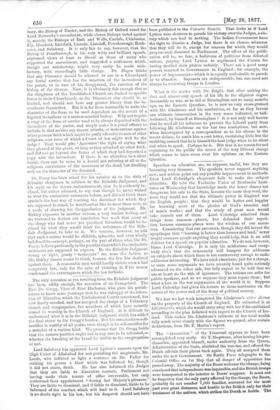Speeches on education are, we suppose, useful, but they are
becoming very tiresome. The speakers never suggest anything new, and seldom point out any possible improvement in methods. Even Lord Coleridge's eloquence fails to make the subject attractive. He told the Yorkshire Union of Mechanics' Insti- tutes on Wednesday that knowledge made the lower classes not dangerous, but safe to the State, because the more they read, the more they would see that the ultimate power in England was the English people ; that they would be better and happier for knowing more of the glories of God's creation and of man's works ; and that the study of great men would take conceit out of them. Lord Coleridge admitted these things were common - places, but defended their repeti- tion because common-places were the wisdom of our ances- tors. Considering that our ancestors, though they did invent the apopthegm that "learning is better than houses and land," never taught common people anything they could help, that is an odd defence for a speech on popular education. We do not, however, blame Lord Coleridge. It is only his misfortune and every- body else's that the community still hungers for addresses on subjects about which there is not controversy enough to make addresses interesting. We have tried elsewhere, just for a change, to state some arguments we have recently heard quite seriously advanced on the other side, but fully expect to be told that we are at heart on the side of ignorance. The truisms are safer for public speakers, and so we suppose they must repeat them ; but what a loss to the few enjoyments of the world it is. Suppose Lord Coleridge had given his lecture to those mechanics on the causes of the power and of the decay of political oratory.


































 Previous page
Previous page